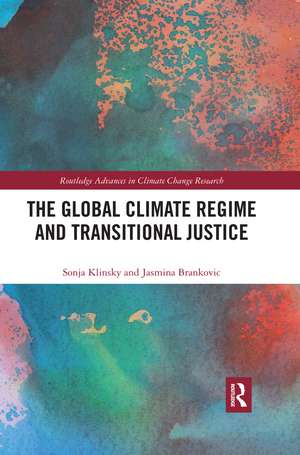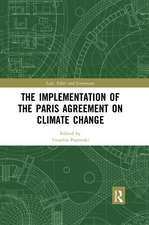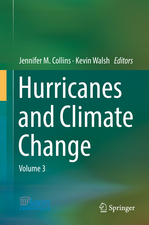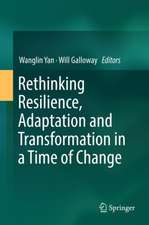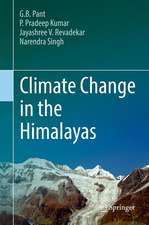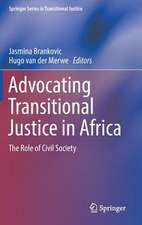The Global Climate Regime and Transitional Justice: Routledge Advances in Climate Change Research
Autor Sonja Klinsky, Jasmina Brankovicen Limba Engleză Paperback – 2 oct 2019
This book examines the potential of transitional justice insights to inform global climate governance. It lays out core structural similarities between current global climate governance tensions and transitional justice contexts. It explores how transitional justice approaches and mechanisms could be productively applied in the climate change context. These include responsibility mechanisms such as amnesties, legal accountability measures, and truth commissions, as well as reparations and institutional reform. The book then steps beyond reformist transitional justice practice to consider more transformative approaches, and uses this to explore a wider set of possibilities for the climate context.
Each chapter presents one or more concrete proposals arrived at by using ideas from transitional justice and applying them to the justice tensions central to the global climate context. By combining these two fields the book provides a new framework through which to understand the challenges of addressing harms and strengthening collective climate action. This book will be of great interest to scholars and practitioners of climate change and transitional justice.
| Toate formatele și edițiile | Preț | Express |
|---|---|---|
| Paperback (1) | 386.57 lei 6-8 săpt. | |
| Taylor & Francis – 2 oct 2019 | 386.57 lei 6-8 săpt. | |
| Hardback (1) | 1000.27 lei 6-8 săpt. | |
| Taylor & Francis – 12 apr 2018 | 1000.27 lei 6-8 săpt. |
Din seria Routledge Advances in Climate Change Research
-
 Preț: 152.55 lei
Preț: 152.55 lei -
 Preț: 311.14 lei
Preț: 311.14 lei -
 Preț: 280.92 lei
Preț: 280.92 lei - 8%
 Preț: 376.64 lei
Preț: 376.64 lei -
 Preț: 310.75 lei
Preț: 310.75 lei -
 Preț: 207.00 lei
Preț: 207.00 lei -
 Preț: 309.87 lei
Preț: 309.87 lei -
 Preț: 320.22 lei
Preț: 320.22 lei -
 Preț: 312.54 lei
Preț: 312.54 lei -
 Preț: 310.14 lei
Preț: 310.14 lei - 8%
 Preț: 390.79 lei
Preț: 390.79 lei -
 Preț: 287.02 lei
Preț: 287.02 lei -
 Preț: 296.73 lei
Preț: 296.73 lei -
 Preț: 482.62 lei
Preț: 482.62 lei -
 Preț: 406.42 lei
Preț: 406.42 lei -
 Preț: 478.77 lei
Preț: 478.77 lei - 18%
 Preț: 1000.27 lei
Preț: 1000.27 lei -
 Preț: 449.41 lei
Preț: 449.41 lei -
 Preț: 449.41 lei
Preț: 449.41 lei - 12%
 Preț: 325.34 lei
Preț: 325.34 lei - 18%
 Preț: 1172.58 lei
Preț: 1172.58 lei - 18%
 Preț: 1001.84 lei
Preț: 1001.84 lei - 18%
 Preț: 1074.44 lei
Preț: 1074.44 lei -
 Preț: 408.16 lei
Preț: 408.16 lei -
 Preț: 449.41 lei
Preț: 449.41 lei - 31%
 Preț: 762.58 lei
Preț: 762.58 lei -
 Preț: 408.74 lei
Preț: 408.74 lei -
 Preț: 299.52 lei
Preț: 299.52 lei - 18%
 Preț: 701.56 lei
Preț: 701.56 lei - 28%
 Preț: 820.32 lei
Preț: 820.32 lei - 18%
 Preț: 1057.09 lei
Preț: 1057.09 lei - 18%
 Preț: 1055.51 lei
Preț: 1055.51 lei - 18%
 Preț: 1053.92 lei
Preț: 1053.92 lei -
 Preț: 416.22 lei
Preț: 416.22 lei - 18%
 Preț: 1053.16 lei
Preț: 1053.16 lei - 30%
 Preț: 847.73 lei
Preț: 847.73 lei - 25%
 Preț: 851.82 lei
Preț: 851.82 lei -
 Preț: 413.94 lei
Preț: 413.94 lei - 18%
 Preț: 1000.27 lei
Preț: 1000.27 lei - 18%
 Preț: 1226.79 lei
Preț: 1226.79 lei -
 Preț: 449.41 lei
Preț: 449.41 lei - 18%
 Preț: 1062.16 lei
Preț: 1062.16 lei - 26%
 Preț: 764.20 lei
Preț: 764.20 lei
Preț: 386.57 lei
Nou
Puncte Express: 580
Preț estimativ în valută:
73.97€ • 77.44$ • 61.21£
73.97€ • 77.44$ • 61.21£
Carte tipărită la comandă
Livrare economică 05-19 aprilie
Preluare comenzi: 021 569.72.76
Specificații
ISBN-13: 9780367430221
ISBN-10: 0367430223
Pagini: 208
Ilustrații: 2
Dimensiuni: 156 x 234 x 15 mm
Greutate: 0.38 kg
Ediția:1
Editura: Taylor & Francis
Colecția Routledge
Seria Routledge Advances in Climate Change Research
Locul publicării:Oxford, United Kingdom
ISBN-10: 0367430223
Pagini: 208
Ilustrații: 2
Dimensiuni: 156 x 234 x 15 mm
Greutate: 0.38 kg
Ediția:1
Editura: Taylor & Francis
Colecția Routledge
Seria Routledge Advances in Climate Change Research
Locul publicării:Oxford, United Kingdom
Public țintă
Postgraduate and ProfessionalCuprins
Acknowledgements
List of Abbreviations
List of Tables and Figures
Introduction: A Transitional Justice Approach to the Climate Change Context
Chapter One: From Climate Harms to Climate Action
Chapter Two: Classic Strategies for Managing Climate Justice Dilemmas
Chapter Three: Managing Responsibility – Amnesty, Legal Accountability, Truth Recovery
Chapter Four: Addressing Climate Harms – Strategies for Repair
Chapter Five: Institutional Reform for Future-Oriented Climate Action
Chapter Six: Transformative Approaches to Climate Justice
Conclusion: Building Solidarity across Divides
List of Abbreviations
List of Tables and Figures
Introduction: A Transitional Justice Approach to the Climate Change Context
Chapter One: From Climate Harms to Climate Action
Chapter Two: Classic Strategies for Managing Climate Justice Dilemmas
Chapter Three: Managing Responsibility – Amnesty, Legal Accountability, Truth Recovery
Chapter Four: Addressing Climate Harms – Strategies for Repair
Chapter Five: Institutional Reform for Future-Oriented Climate Action
Chapter Six: Transformative Approaches to Climate Justice
Conclusion: Building Solidarity across Divides
Notă biografică
Sonja Klinsky is Assistant Professor in the School of Sustainability at Arizona State University, USA.
Jasmina Brankovic is a Senior Researcher with the Centre for the Study of Violence and Reconciliation, South Africa.
Jasmina Brankovic is a Senior Researcher with the Centre for the Study of Violence and Reconciliation, South Africa.
Recenzii
"Klinsky and Brankovic certainly break new ground to extend transitional justice theory to global climate change, and couch the debate about climate change in terms of climate justice, especially integrating climate policy with concerns of justice. They have dexterously shown how transitional justice mechanisms can address thorny questions of past climate harms, and the responsibility and reparation for them." -- Tarique Niazi, Ph.D., Professor of Environmental Sociology at the University of Wisconsin, Eau Claire
"It's time for new ideas on dealing with climate change and its devastating impacts on some people and nations. In this original, needed, and compelling mash-up of two distinct fields, Klinsky and Brankovic bring vast knowledge of time-tested solutions developed in knotty conflicts and efforts to rebuild societies after brutal dictatorships or civil wars to bear on the issue of climate justice. The Global Climate Regime and Transitional Justice gets us remarkably far down the road of thinking this through, providing lessons and proposing considered ways forward on issues like who might constitute a truth commission, what reparations might look like, and why we really need all this. A major contribution." --Timmons Roberts, Climate and Development Lab, Brown University, USA
"The authors are to be commended for presenting a fresh, thought-provoking and informed perspective on the political and legal dimensions of climate justice. The book offers a valuable contribution to the emerging literature on how climate justice could achieve the transition from ideal to reality." – Jonathan Pickering, Postdoctoral Fellow at the Centre for Deliberative Democracy and Global Governance, University of Canberra, Australia
"This book is a must-read for all who work in the field of climate justice, institution building, and transformation with a forward-looking approach. The authors highlight the essential purpose of both responses to climate change and transitional justice, and the experience we have drawn from transitional justice over the last decades. Justice is more than punishment and atonement. It is to establish human rights - and good governance-based sustainable institutions that are resilient and responsive enough to the challenges climate change pose to us. Transitional justice measures and procedures build the foundations not only to deal with past wrongdoings or man-made disasters, they also provide pathways to repair past climate injustice and work toward preventing recurrence, as shown in this book." -- Anja Mihr, Center on Governance through Human Rights, Humboldt-Viadrina Governance Platform, Germany
"Klinsky and Brankovic comprehensively apply transitional justice principles to climate change regulation. Their analysis discloses thought-provoking insights, necessarily de lege ferenda, and provides ground-breaking suggestions for further developing specific substantive and procedural regulation." – Ottavio Quirico, Senior Lecturer in International Law, University of New England, USA
"It's time for new ideas on dealing with climate change and its devastating impacts on some people and nations. In this original, needed, and compelling mash-up of two distinct fields, Klinsky and Brankovic bring vast knowledge of time-tested solutions developed in knotty conflicts and efforts to rebuild societies after brutal dictatorships or civil wars to bear on the issue of climate justice. The Global Climate Regime and Transitional Justice gets us remarkably far down the road of thinking this through, providing lessons and proposing considered ways forward on issues like who might constitute a truth commission, what reparations might look like, and why we really need all this. A major contribution." --Timmons Roberts, Climate and Development Lab, Brown University, USA
"The authors are to be commended for presenting a fresh, thought-provoking and informed perspective on the political and legal dimensions of climate justice. The book offers a valuable contribution to the emerging literature on how climate justice could achieve the transition from ideal to reality." – Jonathan Pickering, Postdoctoral Fellow at the Centre for Deliberative Democracy and Global Governance, University of Canberra, Australia
"This book is a must-read for all who work in the field of climate justice, institution building, and transformation with a forward-looking approach. The authors highlight the essential purpose of both responses to climate change and transitional justice, and the experience we have drawn from transitional justice over the last decades. Justice is more than punishment and atonement. It is to establish human rights - and good governance-based sustainable institutions that are resilient and responsive enough to the challenges climate change pose to us. Transitional justice measures and procedures build the foundations not only to deal with past wrongdoings or man-made disasters, they also provide pathways to repair past climate injustice and work toward preventing recurrence, as shown in this book." -- Anja Mihr, Center on Governance through Human Rights, Humboldt-Viadrina Governance Platform, Germany
"Klinsky and Brankovic comprehensively apply transitional justice principles to climate change regulation. Their analysis discloses thought-provoking insights, necessarily de lege ferenda, and provides ground-breaking suggestions for further developing specific substantive and procedural regulation." – Ottavio Quirico, Senior Lecturer in International Law, University of New England, USA
Descriere
This book examines the potential of transitional justice practices to inform global climate governance. By combining these two fields the book provides a new framework through which to understand the challenges of building solidarity and collective climate action.
